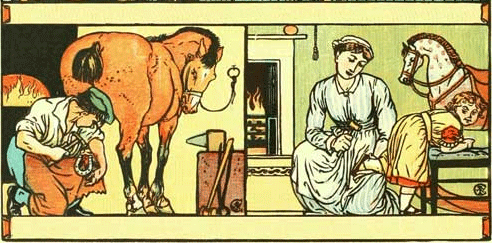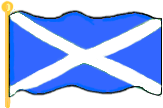John Smith, Fallow Fine
C'est très proche de la comptine anglaise "Robert Barnes, Fellow Fine".
D'après "Notes on The Folk-Lore of the North-East of Scotland" de Walter Gregor (1881) : "La nourrice répétait la comptine suivante en retirant les chaussons de l'enfant et en imitant le maréchal-ferrant en train de clouer le fer sur le sabot du cheval…"

John Smith, Fallow Fine
Jean Lefèvre, mon bon ami
Comptine
Comptine
(Scots)
(Français)
John Smith, fallow fine,
Can you shoe this horse o' mine?
Aye, indeed, and that I can,
As well as ony man!
There's a nail upon the tae,
To make the powny speel the brae;
There's a nail and there's a brod
-a horse weel shod.
Jean Lefèvre, mon bon ami,
Pouvez-vous ferrer mon cheval ?
Oui, bien sûr, je peux le faire
Aussi bien que tout un chacun !
Voilà un clou sur le sabot,
Pour que le poney monte la pente,
Voilà un clou et en voilà un large*
-un cheval bien ferré.
Notes
Voici une autre version de "Notes on The Folk-Lore of the North-East of Scotland" de Walter Gregor (1881)"
"John Smith, a fellow fine,
Cam t' shee a horse o' mine.
Pit a bit upo' the tae,
T' gar the horsie clim' the brae;
Pit a bit upo' the brod,
T' gar the horsie clim' the road;
Pit a bit upo' the heel,
T' gar the horsie trot weel."
Traduction
Jean Lefèvre, un brave gars,
Est venu ferrer mon cheval.
Il a un peu tapé sur le sabot,
Pour que le petit cheval monte la colline,
Il a un peu tapé sur le clou*
Pour que le petit cheval monte la route,
Il a un peu tapé sur le talon
Pour que le petit cheval trotte bien.
* "brod", en Scots, désignait un clou à tête large (broad)



